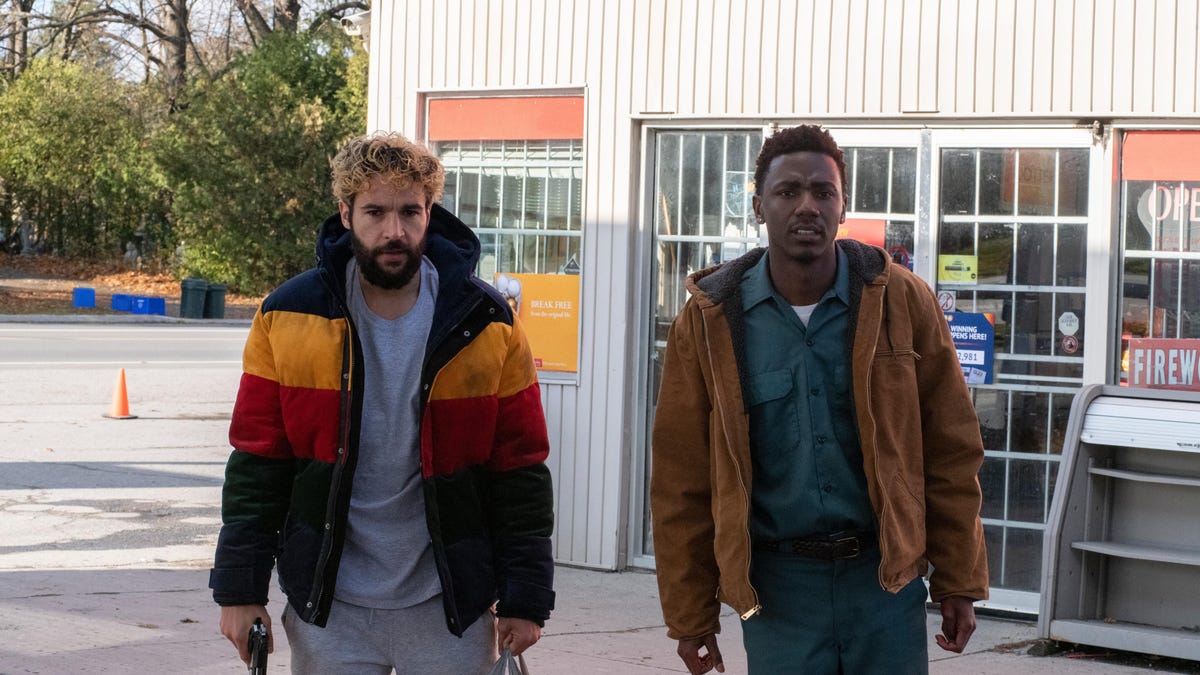
Jerrod Carmichael’s directorial debut and star vehicle On The Count Of Threewhich revolves around a suicide pact made by two best friends, bears no resemblance to The Carmichael Show or his stand-up sets, even if he casually joked about offing himself during his SNL monologue. Brooding and languorous, the film is devoid of personality, his de ella or otherwise—which is not necessarily to say that it’s bad, but that you should calibrate your expectations accordingly. Indeed, the film’s trailer carried a trigger warning and phone numbers for both the National Suicide Prevention Lifeline and the Crisis Text Line, a clear indication of what lies ahead.
The film opens with an out-of-nowhere nod to John Woo, as Val (Carmichael) and Kevin (Christopher Abbott of Hulu’s Catch-22) aim pistols at each other in a strip club parking lot and commence the titular count. A single gunshot is heard over cut-to-black, before the tone immediately shifts to irony with the dissonant deployment of The Free Design’s cheerful “Love You” on the soundtrack. Flash back to earlier that day, where Kevin is ruminating in a hospital after a suicide attempt a few days before. He verbally abuses a therapist when his “I feel so lucky to be alive” spiel fails to stick. Kevin has been treated for mental issues since he was an 8-year-old in foster care, and has apparently had enough.
Val, meanwhile, works a dead-end job selling mulch. His colleague Todd (Jamie Mac) obtusely employs the phrase “crack the whip”—repeatedly, lest it go over your head the first time—to describe management clamping down on smoke breaks. Travis Tritt’s “It’s A Great Day To Be Alive” is heard, presumably over their store’s sound system, a befitting accompaniment for any bleak small town (a composite of dumpier locations in Ottawa, Ontario, and Syracuse, New York). Upon receiving news of his promotion to floor manager, Val immediately goes inside a bathroom stall and tries to hang himself with a belt. In case you missed it the first time, the film again hammers home “It’s A Great Day To Be Alive,” with Todd singing the tune a cappella within earshot.
After Val’s attempt fails, he decides to facilitate Kevin’s escape from the hospital, weapons ready in the getaway Jeep, which brings us back to where the film started. But Kevin chickens out, and suggests they table the double suicide until later that day. As they review options for their last day on Earth, carrying out long-harbored revenge fantasies fast emerges as the no-brainer. Kevin faces down a high school bully, and plots to assassinate Dr. Brenner (Henry Winkler), a therapist who molested him as a boy. Val confronts his abusive father of him (JB Smoove), who stole money from him.
G/O Media may get a commission
Carmichael and Abbott exhibit minimal chemistry on screen, and there’s little evidence that Val and Kevin are besties. At points they come close to a new lease on life, at a shooting range and at the dirt bike track where they used to work, an implication that their will to live is somehow tied to their attainment of power and their aggression level. The film teases the potential of this platitudinous life-affirming discovery, only to turn around and validate Val and Kevin’s view that the world is indeed a miserable place full of awful people. There is no chance of forgiveness or reconciliation between them and their remorseless former tormentors. It’s an incredibly pessimistic outlook, but one that some apparently find humorous.
Ari Katcher and Ryan Welch, two of the three creators behind Hulu’s Remmy, claimed the Waldo Salt Screenwriting Award at the 2021 Sundance Film Festival for On The Count Of Three. They toy with a conventional narrative here on mental illness and suicide in the film, as Val and Kevin carry out obligatory conversations about suicide attempts being cries for attention or help, and suicide not being the answer to problems they face. But by day’s end, the two characters have seemingly shifted their positions and drawn very different conclusions for themselves.
On The Count Of Three is not didactic, and thank goodness the filmmakers at least have the good sense to recognize that preachiness helps no one and solves nothing. But the film dumbs down a complex and taboo topic by placing blame squarely on bogeymen like bullies and abusers. The filmmakers don’t invest any time depicting what depression might actually look and feel like, so that those who suffer from it can recognize it, and those who don’t can empathize. And at a lean 86-minute runtime, the film could have benefited from the inclusion of moments of silence, contemplation, and solitude to help illustrate the characters’ mental state, and the anguish and circumstances that drove them into their positions.
.
